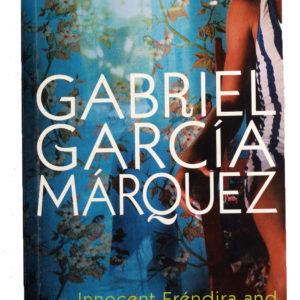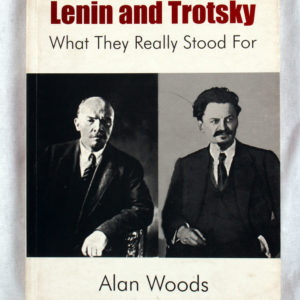Innocent Erendira and Other Stories | Gabriel García Márquez
₨ 478.40
This collection of fiction, representing some of García Márquez’s earlier work, includes eleven short stories and a novella, Innocent Eréndira, in which a young girl who dreams of freedom cannot escape the reach of her vicious and avaricious grandmother.
- Categories: Books, Fiction
- Tags: Gabriel García Márquez, Innocent Erendira and Other Stories, Leftshop, leftshopnepal, radical books, rare readings, red books
“The stories are rich and startling in their matter and confident in their manner….They are–the word cannot be avoided–magical.”–John Updike, The New Yorker
This collection of fiction, representing some of García Márquez’s earlier work, includes eleven short stories and a novella, Innocent Eréndira, in which a young girl who dreams of freedom cannot escape the reach of her vicious and avaricious grandmother.
“García Márquez’s fictional universe has the same staggeringly gratifying density and texture as Proust’s Faubourg Saint-Germain and Joyce’s Dublin….Arguably the best of the Latin Americans.”–Martin Kaplan, The New Republic
“It is the genius of the mature García Márquez that fatalism and possibility somehow coexist, that dreams redeem, that there is laughter even in death.’–John Leonard, New York Times
Related products
This Ideas Of Lenin And Trotsky Are Without Doubt The Most Distorted And Slandered In Histoy. For More Than Eighty Years, They Have Been Subjected To An Onslaught From The Apolgists Of Capitalism, Who Have Attempted To Present Their Ideas – Bolshevism – As Both Totalitarian An Utopian. An Entire Industry Was Developed In An Attempt To Equate The Crimes Of Stalinism With The Regime Of Workers’ Democracy That Existed Under Lenin And Trotsky.
Authors : Alan Woods, Ted Grant
Publisher : Aakar Publications
This book made history. It wasn’t banned, not quite, when it first appeared in 1984, but its disappearance was cleverly managed so that few got to read the only authentic account of how a protected kingdom became India’s twenty-second state. As the Hon. David Astor, editor of The Observer in London, wrote, Sunanda K. Datta-Ray was ‘alone in witnessing and communicating the essential story’. He had to surmount many obstacles and incur severe disapproval to do so. Nearly thirty years later, a revised edition with the author’s long new introduction reads like an exciting thriller. Rich with dances and durbars, lamaist rituals, intrigue and espionage, it brings vividly to life the dramatis personae of this Himalayan drama—Sikkim’s sad last king, Chogyal Palden Thondup Namgyal, and his vivacious American queen, Hope Cooke; bumbling Kazi Lendhup Dorji and his scheming Kazini, whose nationality and even her name were shrouded in mystery, and who played into the hands of more powerful strategists. Citing documents that have not been seen by any other writer, the book analyses law and politics with masterly skill to recreate the Sikkim saga against the background of a twentieth-century Great Game involving India and China. Smash and Grab: Annexation of Sikkim didn’t only make history. It is history.
Translated from the Hindi by Madhu Singh With a foreword by Angela Y. Davis
September 1970. Ramchandra Singh enters the Hardoi District Jail in Uttar Pradesh as a naxalite undertrial. Barely twenty, his life of expanding prospects—in studies, politics and love—is reduced to the horizon of a life term. The odds are stacked against the survival of his humanity and imagination, but Singh regenerates his gifts of empathy, humour, reflection and, above all, language—in a secret diary smuggled out with the help of friends.
A singular record of recent history and of individual witness, Singh’s prison diary, newly expanded, appears in English for the first time. Offering unprecedented intimacy with the everyday life of the imprisoned everyman, Singh challenges us to look without flinching and question our assumptions about crime and punishment.
Ramchandra Singh (1949–2018), of Bangarmau village in Unnao district of Uttar Pradesh, was a member of the Communist Party of India (Marxist–Leninist) Red Star, and served on its Central Committee. He was part of the editorial board of Red Star Monthly (Hindi). He passed away when this book was in press.
Madhu Singh is a professor in the Department of English and Modern European Languages, University of Lucknow. She has previously translated the scholar G.N. Devy’s work, A Nomad Called Thief, into Hindi as Ghumantu Hain Chor Nahin.
Choudhury, here, reignites the debate over the appropriation of Ambedkar. Amidst rising echoes for Ambedkar-Marx, Ambedkar-Marx-Bhagat Singh, Ambedkar-Marx-Gandhi-Bhagat Singh, he provocatively asks us to think of Ambedkar’s singular exceptionality—from an excerpt in Indian Cultural Forum
What is most interesting about this difficult but beautiful book is that it is committed to the task of exposing the naked antagonisms that snake across the cracked surfaces of these oppressive structures. —Scroll.in
Nowadays when Ambedkar scholarship has become an industry, Choudhury’s thesis approaches him from an entirely new perspective.—The Telegraph










Reviews
There are no reviews yet.